23 Companion Plants for Eggplants (With Pictures)
-
Pete Ortiz
- Last updated:
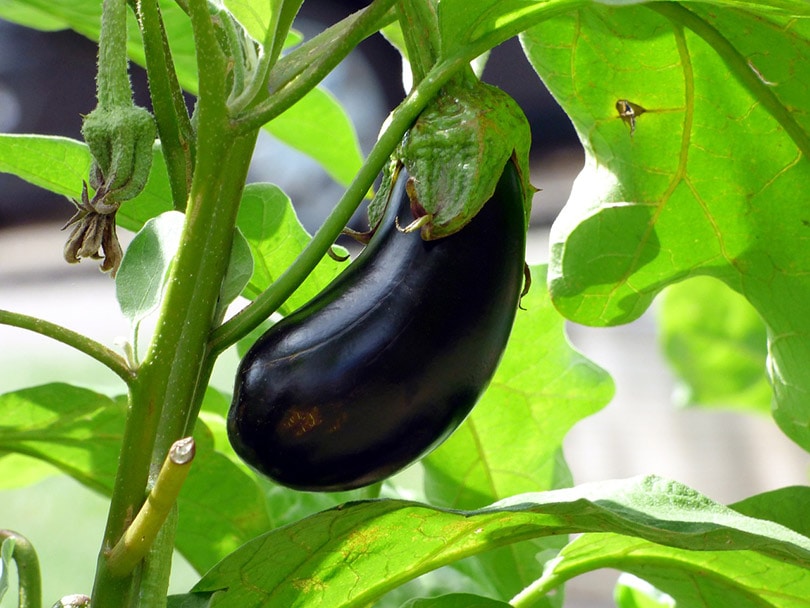
Eggplants are popular vegetables often grown in home gardens. Gardeners love this vegetable because it comes in several shapes, colors, and sizes. You can also pair the eggplant with a few companion plants to fully utilize the space of your home garden.
When companion planting is done right—by pairing plants with similar growing conditions and preferences—you can create a harmonious, symbiotic relationship. They will produce larger crops, add more nutrients to the soil, offer shade from the sun, enhance NPK, and offers pest protection.1
In this article, we have compiled a list of all the best companion plants for eggplants. We have also highlighted some of the worst companion plants that shouldn’t be grown with eggplants. Read on to learn more.
The 23 Great Companion Plants for Eggplants
Nightshade Companions
It makes sense that the best companion plants for eggplants would also be members of the same family. When planted together, they grow well without competing for nutrients. Moreover, they have similar sunlight requirements, fertilizing needs, and watering needs.
However, there is a caveat. If you get pest infections in one plant, all your plants will be affected. Also, though not very often, they might be competition for space and nutrients. Fortunately, you can provide your plants with quality organic soil to supplement the soil nutrients.
Nightshade species that make great companion plants for eggplants include:
1. Tomatoes
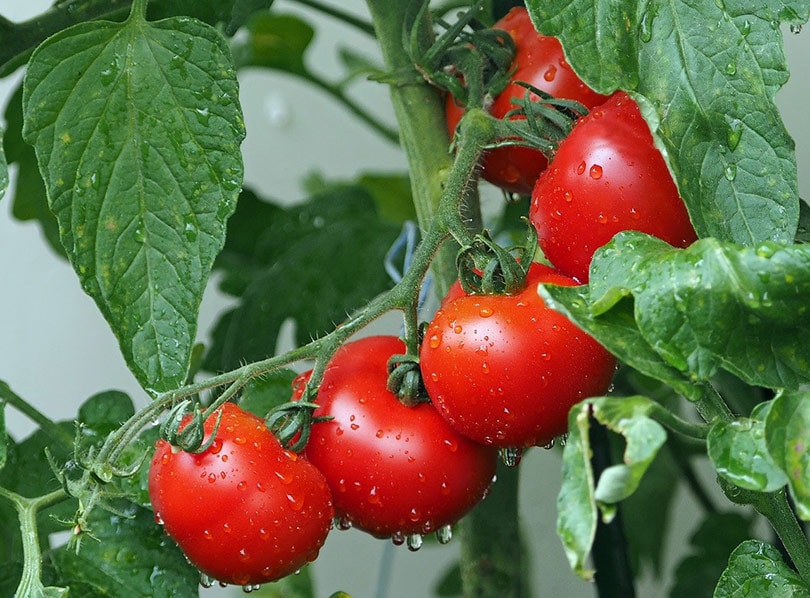
Tomatoes do very well when paired with eggplants. Even better, they are paired as ingredients in most dishes. So, you can grow and harvest them together for your homemade meals. However, be on the lookout for large tomato leaves blocking the eggplant that minimize sunlight exposure to your eggplants.
2. Potatoes

The potato plant is one of the most versatile crops among the nightshade family. It is also a stable ingredient in a variety of recipes. When used as a companion plant for eggplants, ensure that the potato variety you plant doesn’t exhaust nutrients and nitrogen reserves from the soil.
Sure, some websites may discourage using potatoes as an eggplant companion plant, but if done right, they can happily coexist. Just be sure to check the soil’s nutrient composition and regularly add plant supplements as required. Potato plants can even shade your eggplants from the harsh glare of the summer sun, thus preventing burnt foliage.
3. Peppers
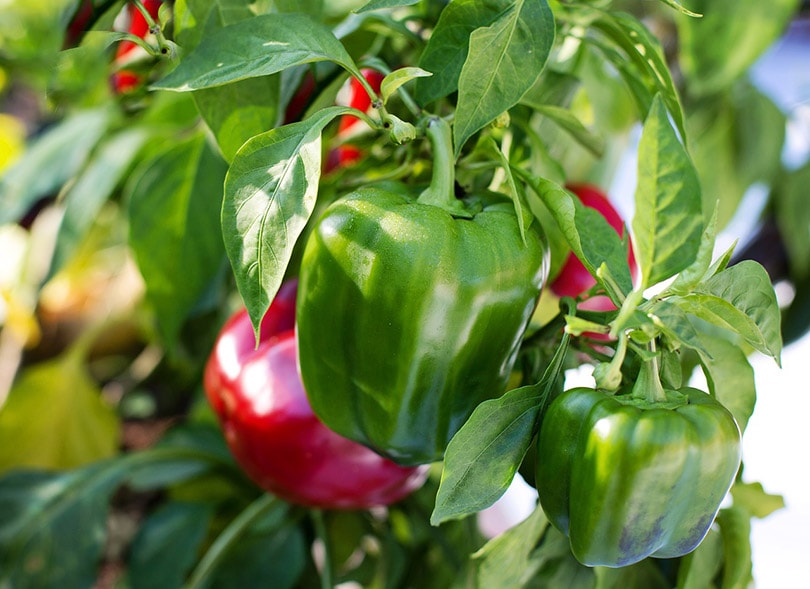
Eggplants share similar growing conditions with peppers, making them good partner plants. They don’t necessarily rely on specific cultivars, so you can pair the eggplant with either mild or hot peppers. This pairing helps reduce pests and bugs in your garden bed. Furthermore, peppers add a chemical to the root system, which helps prevent fungus and root rot under the soil.
Be sure to monitor the soil metrics using a soil meter. Also, remember that when multiple nightshade species are planted together, they promote competition, resulting in smaller crop yields. Your soil will deplete its nutrients over time, so your plants need to be reseeded with fresh soil. In such a situation, crop rotation would help prevent pest recurrence and nutrient competition between members of the nightshade family.
Herb Companion Plants for Eggplants
Some herb species make excellent partners for nightshade plants because of their strong scents that not only attract beneficial insects like pollinators but also naturally repel pests from your garden. The herbs that make great companion plants for eggplants include:
4. Catnip
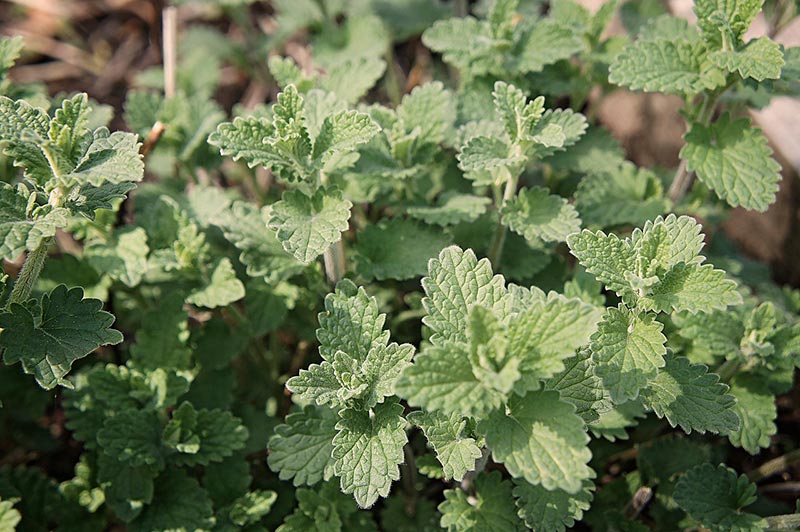
It is safe to plant eggplants near catnip. However, you should never plant catnip next to any legume species that are nearby. Be it beans or peas, they will end up competing for nutrients. Consequently, both plants will be stunted and unable to reach their full crop yield.
So, if you are contemplating planting eggplants with catnip, ensure no other legumes are present in your garden. Also, if you have cats, you should be cautious because the furry creatures will step all over your plants as they try to access the catnip. Wire fencing may be important if pairing catnip with eggplants.
5. Oregano
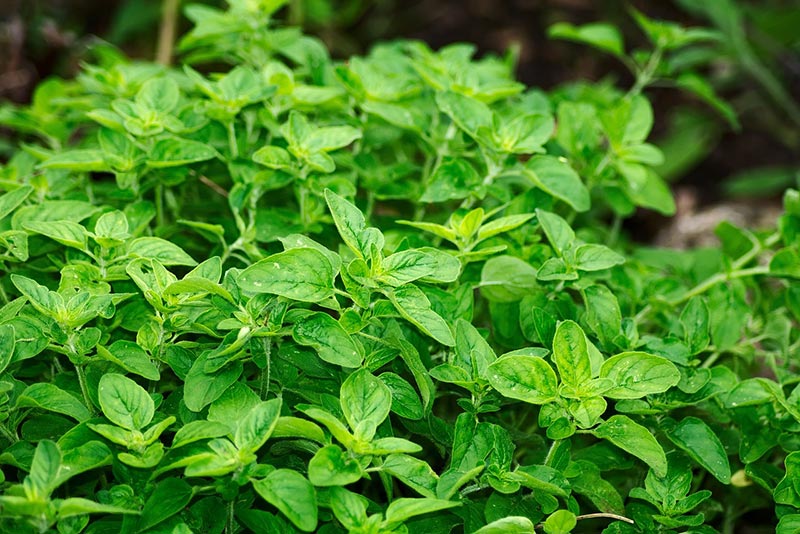
Oregano is a wonderful addition to a home garden. If grown as a companion plant, it can repel spider mites, aphids, and cabbage moths. Oregano also attracts pollinators, such as ladybugs and honey bees, to your garden.
6. Cilantro
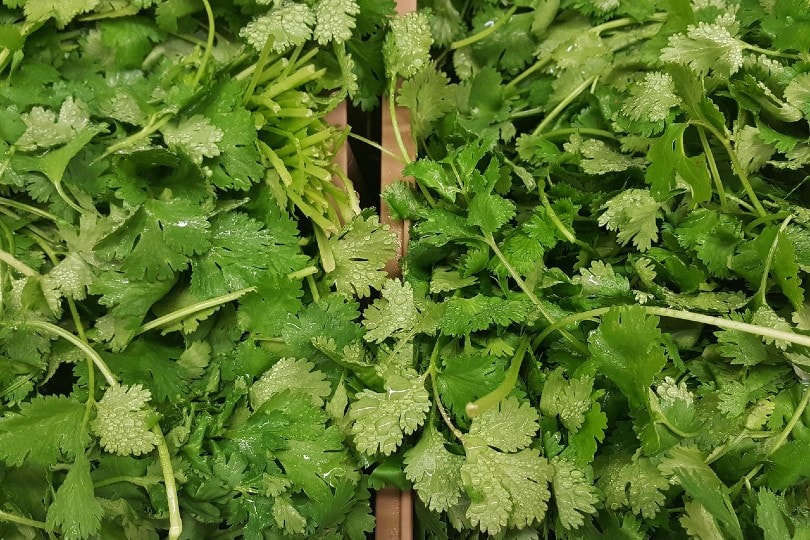
Like Oregano, cilantro plant species attract natural predators that feed on beetles. This will help protect your vegetables from being attacked by pests. Also, its pleasant scent will keep your garden smelling great all year round.
7. Lemon Balm
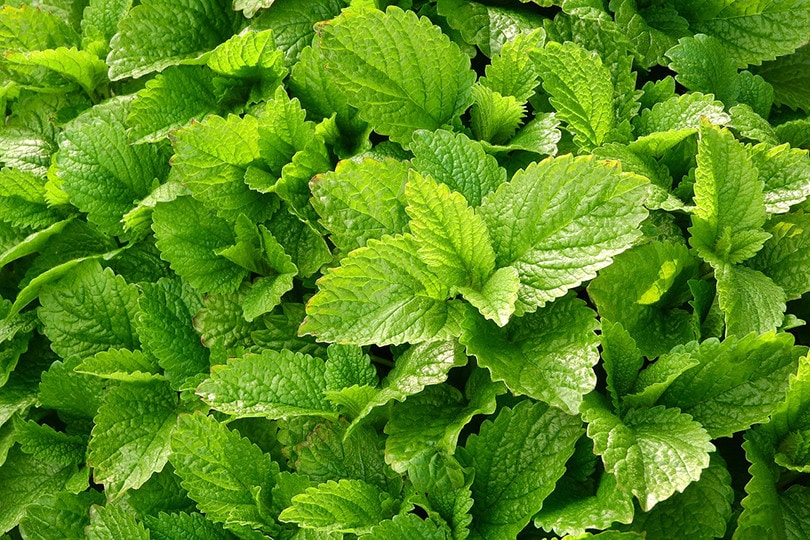
Lemon balm is also a great partner plant for eggplants due to the natural citrus smell that it produces. The scent will help keep bugs like spiders, snails, slugs, and pill bugs from your precious vegetable garden.
8. Rosemary
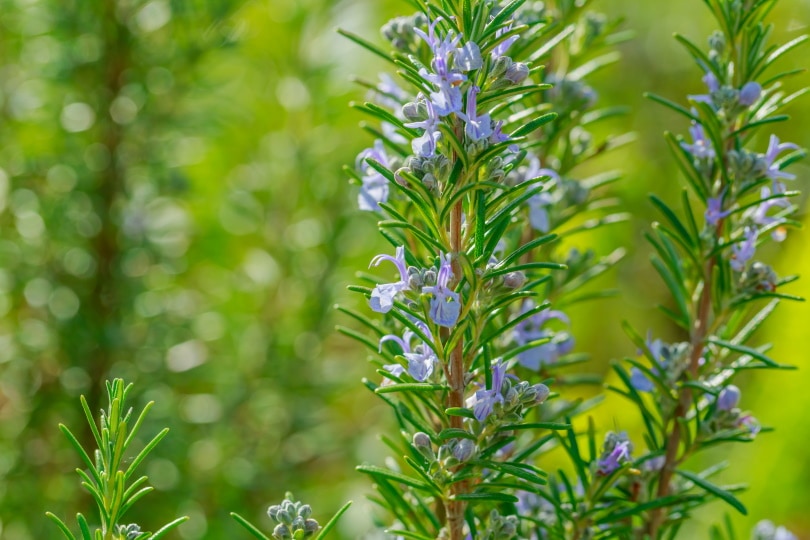
Plant rosemary next to your eggplant or other vegetables to repel the Colorado potato beetle. It is a great pet deterrent companion plant. When choosing which variety to grow, it’s better to go for the highly scented ones because they also help improve the flavor of the eggplants.
Vegetable Companions for Eggplants
The symbiotic relationship between vegetables benefits both plants in several ways. Before choosing a vegetable for your home garden, first ensure that it grows in your hardiness zone. The best partner vegetable plants for eggplants include:
9. Spinach
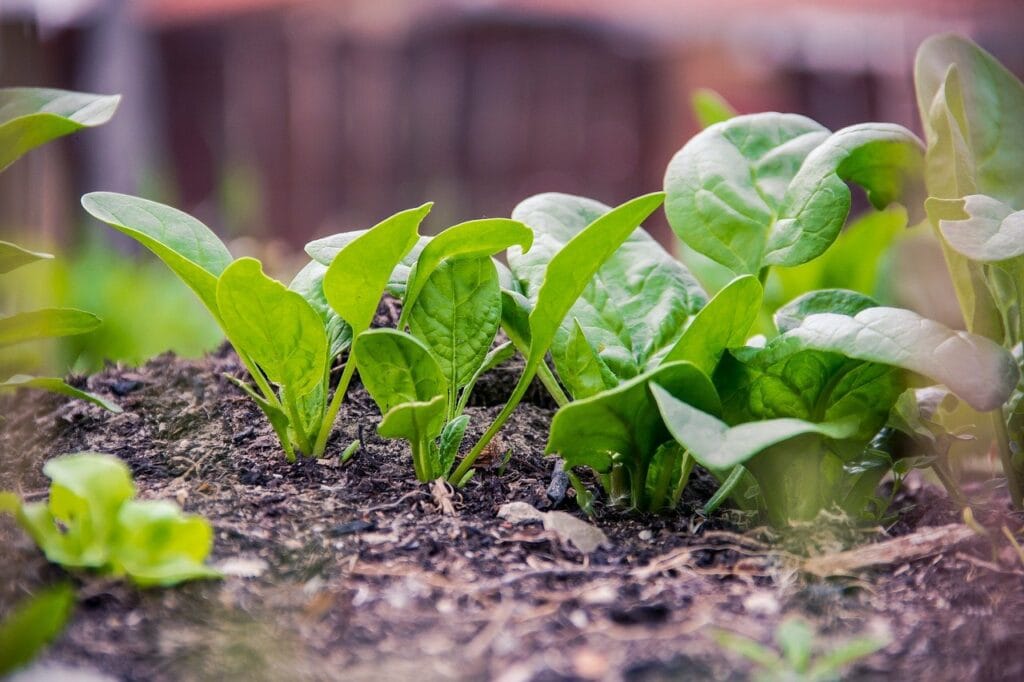
As a leafy plant, spinach is planted for its green foliage. The large, broad leaves protect your eggplants from the harsh sun glare, especially on hot summer days. Moreover, the large leaves protect the soil from evaporation so that you don’t have to water your plants as often.
Spinach also helps in eggplant development and, in some instances, can also help keep weeds out of your garden. When harvested together with the eggplants, they also make a lovely meal.
10. Cabbage
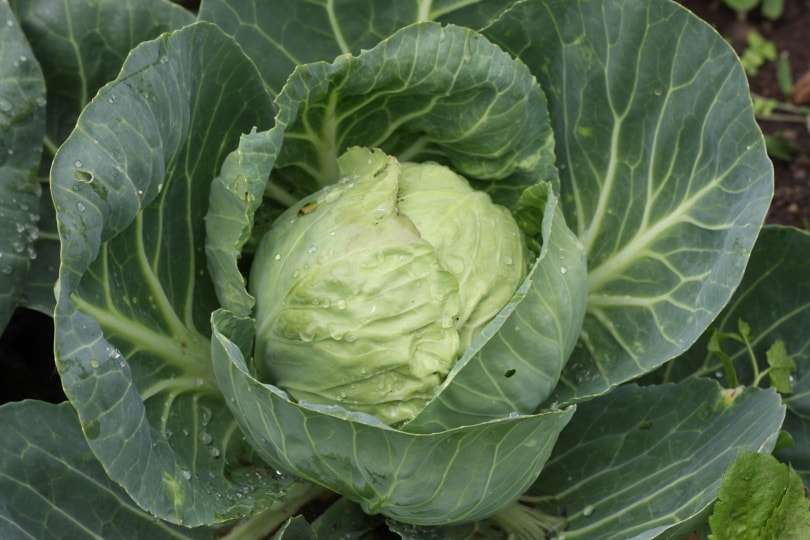
Cabbage is a great partner plant for eggplants, especially when used as a trap crop. This simply means cabbage can deter insects away from your eggplants. It makes a good decoy plant because it lures away insects like the flea beetle. Beetles often favor cabbage over eggplants. Granted, this is not a cheap option, but it is still viable when done right.
11. Radish
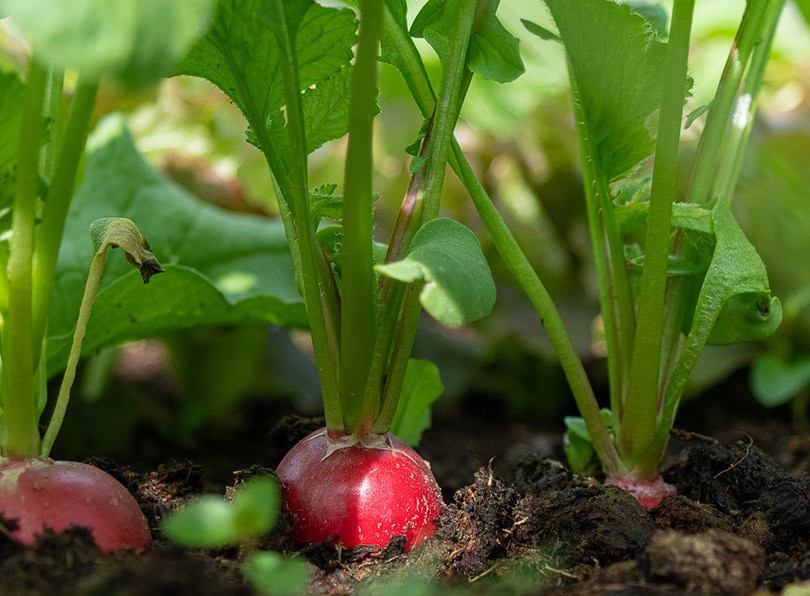
Radishes also make fine partners for eggplants. They are a great option, especially if growing your eggplants in a small, limited space where other “needy” plants would not comfortably grow and thrive.
12. Okra
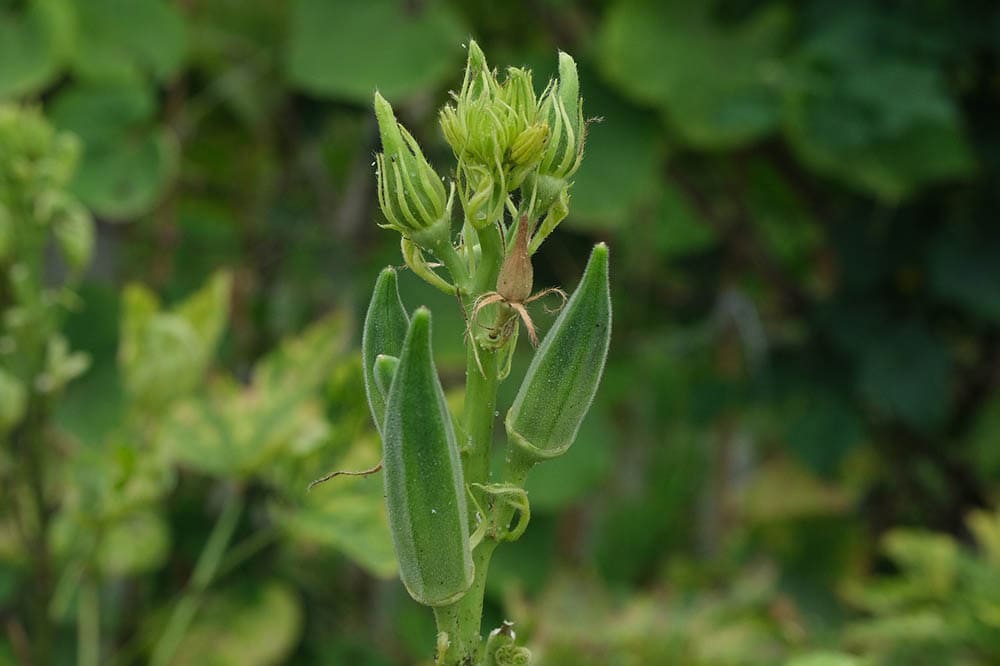
Okra pairs well with eggplants because they share the same watering requirements and Okra increases nitrogen content in the soil. So, you can simply feed and water your plants simultaneously in your vegetable garden. Maintenance practices are also similar.
13. Kohlrabi
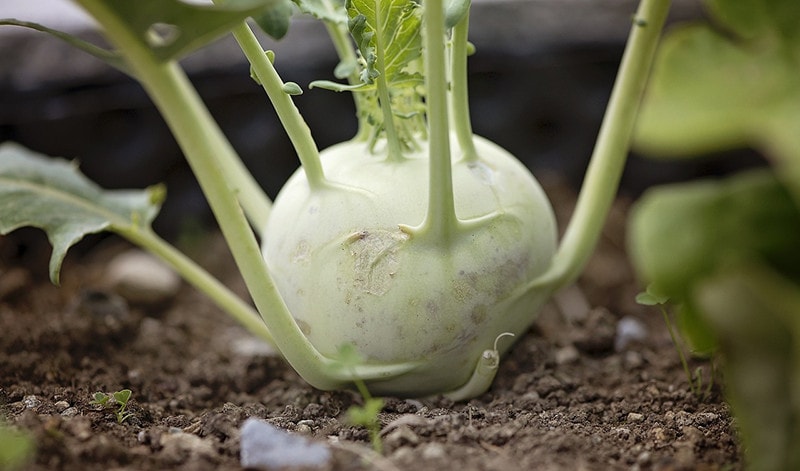
This little-known plant is mostly planted next to eggplants due to its insect-deterrent properties. Kohlrabi can repel cabbage beetles and aphids, especially if used as a barrier plant. Moreover, it helps shade eggplants from the hot, scorching midday sun.
14. Amaranth
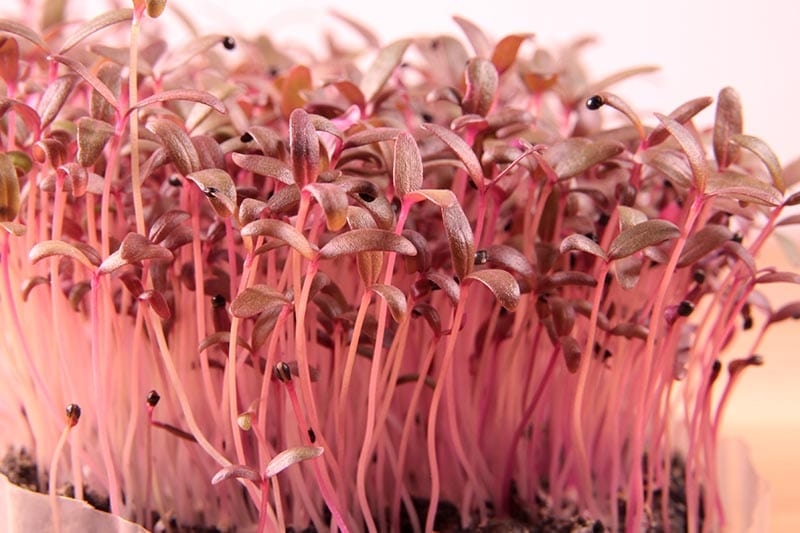
Amaranth shares the same growing requirements with eggplants, so they can be spread out in the garden where eggplants are growing. It repels some harmful insects and loosens the soil for better drainage. Furthermore, amaranth can be harvested at the same time as eggplants.
Flower Companions for Eggplants
Some flowering plants make great companion plants when planted next to your eggplants. They include:
15. Marigolds
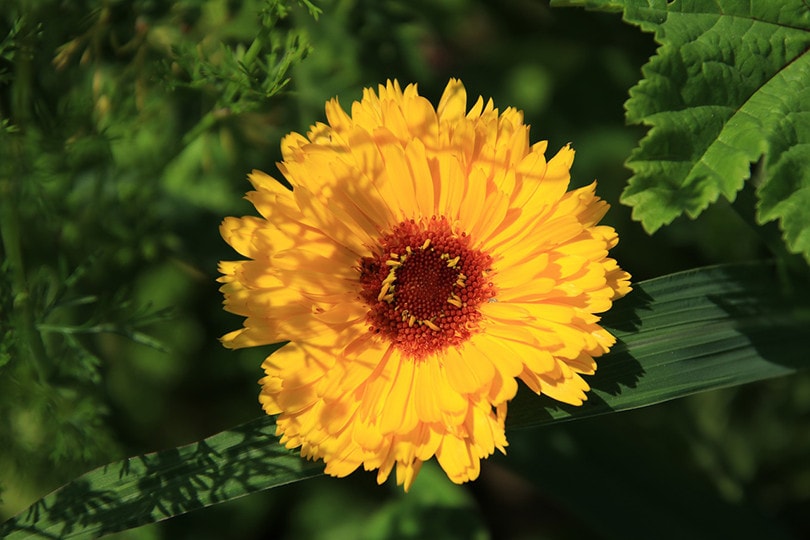
To most gardeners, Marigold is one of the best flowering plant species to pair with eggplants because of its pest-repelling properties. They also attract a lot of attention from pollinators, such as bees and birds, which also benefit the surrounding plants in your garden. So, if you have pests such as flies, ants, fleas, beetles, and aphids attacking your eggplants, marigolds will keep them away. The flower also discourages nematodes.
Unfortunately, the Mexican marigold species might keep pests at bay, but it introduces toxicity to legumes, such as beans and peas. So, you should be cautious if growing a variety of legumes near your eggplants.
16. Borage
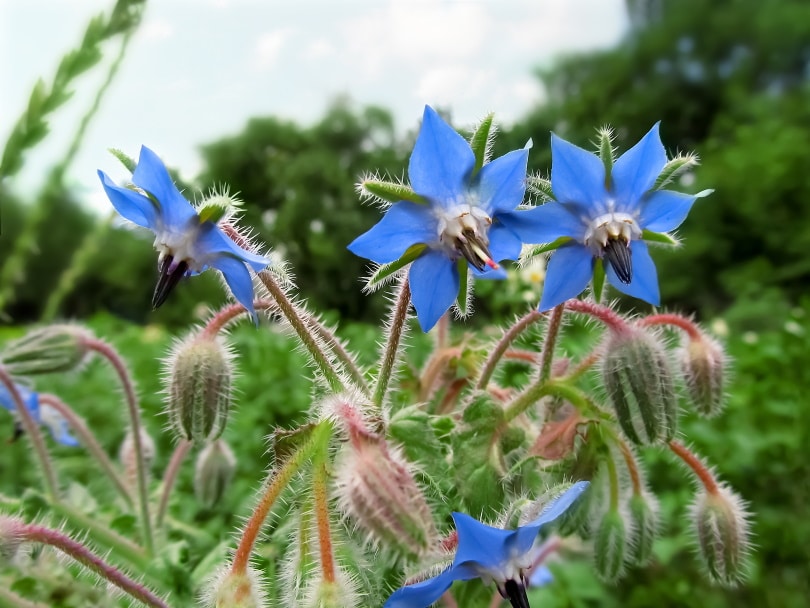
Borage, a cousin of oregano, is also a good companion plant because it helps keep worms and larvae away from your eggplants. If you notice cut marks on your eggplant foliage, simply plant oregano, which attracts birds and bees to feed on these pesky insects. Sure, it might not be as popular as its cousin species, yet it still has several uses in a home garden.
17. Sunflowers
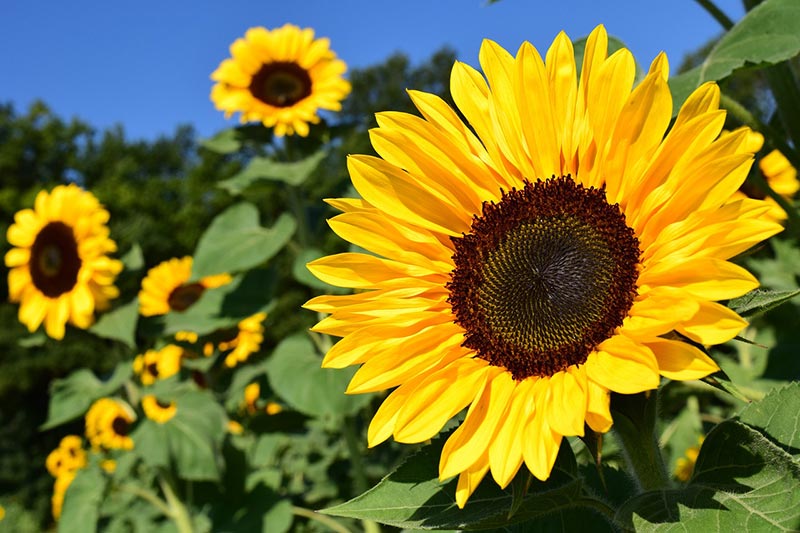
Sunflowers are beautiful, easy to grow, and very versatile in use. They are also good companion plants because they attract beneficial pollinators to your backyard. However, sunflowers lack the pest-repelling power of other flowering species. But they more than makeup for their sunny disposition, which attracts birds that eat the beetles that may attack your eggplants.
18. Nasturtium
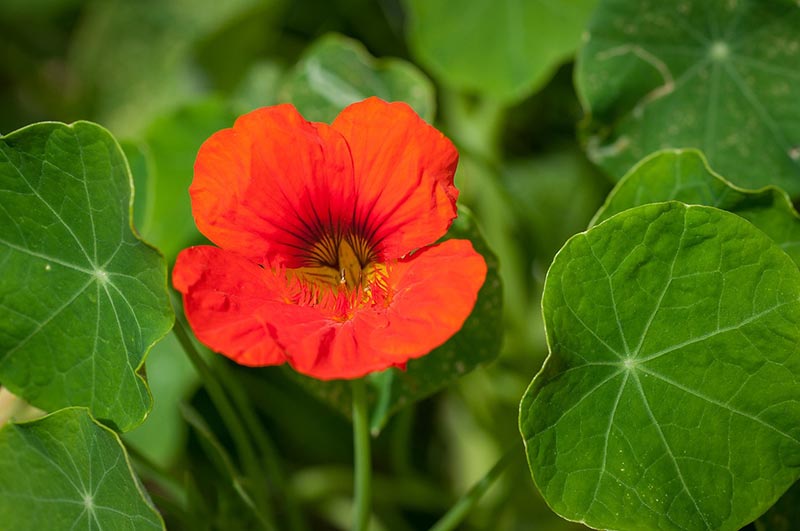
Nasturtium is often grown next to eggplants as a decoy plant to bait any insects wandering around your vegetable garden. Instead of feeding on the eggplants, they will feed on the nasturtium.
This plant species is easy to grow, cheap, and can be sacrificed to pests to ensure that your eggplants thrive. Insects like aphids are especially attracted to this companion plant. Nasturtium also helps prevent weeds from taking over your garden.
Legume Companions for Eggplants
It is a well-documented fact that legumes and beans help add nitrogen to the soil. Eggplants will benefit from the nitrogen-rich soil and could even eliminate the need to fertilize the soil with nitrogen fertilizers if the soil is lacking.
However, use a soil meter to confirm the soil nutrient profile before using legumes as a companion plant. Too much nitrogen will force your eggplants to produce smaller fruits and more foliage instead. This will consequently reduce the crop yield.
Here are the ideal legumes to pair with your eggplants:
19. Peas
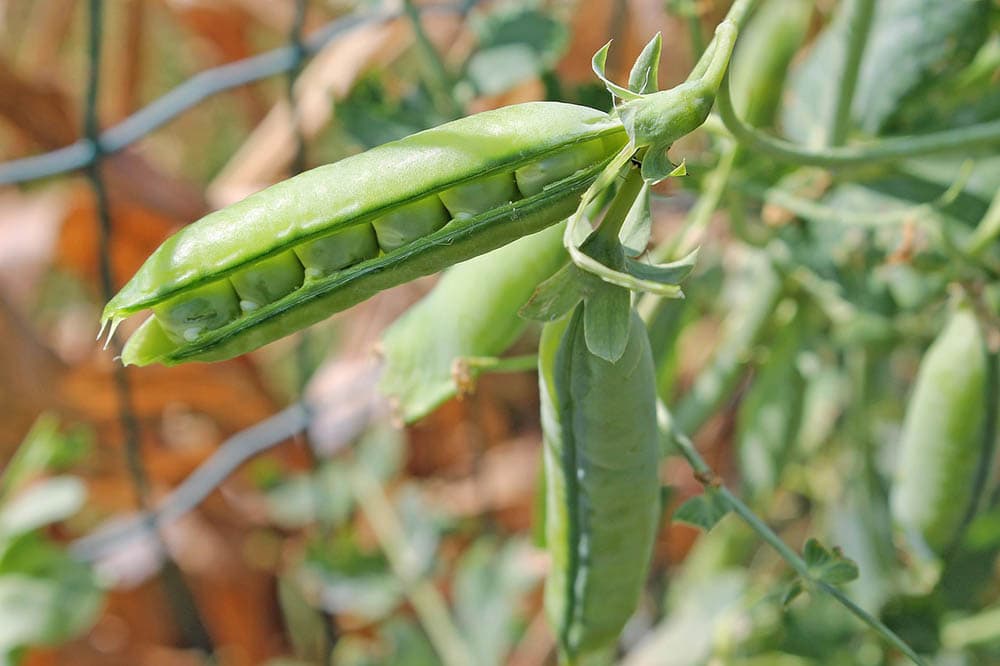
Peas can add more nitrogen content to the soil than most legumes. This is because it derives its nitrogen content from the air and adds it to the substrate. If your garden soil naturally lacks nitrogen or potassium, simply plant peas to fertilize any plants growing nearby.
20. Lentils

Lentils are also ideal companion plants for eggplants because they can easily stimulate nitrogen production in your substrate plant. With lentils growing next to your eggplants, you will not need any nitrogen supplements. Also, after a while, these plants tend to cut off after maturity, allowing your eggplants to enjoy the unused space while utilizing the lentil roots as compost.
21. Pole Beans and Bush Beans
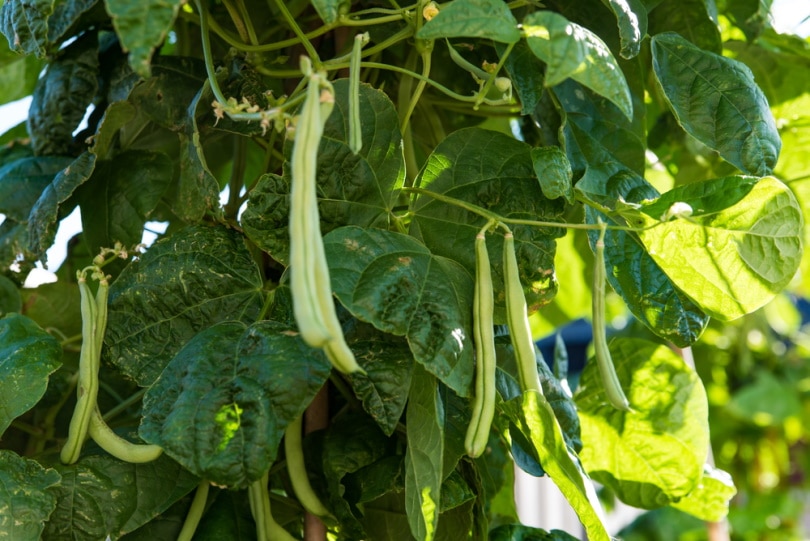
Pole beans are suitable as partner plants because they provide natural support to eggplants as they grow up. Like pole beans, most vine plants produce a trellis that naturally wraps around tall surrounding plants. Before using pole beans as companion plants, keep in mind that the height of pole beans can grow too high. Tall beans could cover eggplants, possibly preventing sun rays from reaching the lower plants.
On the other hand, legumes such as bush beans will naturally help prevent pests such as the Colorado beetles from attacking your eggplants.
22. Squash
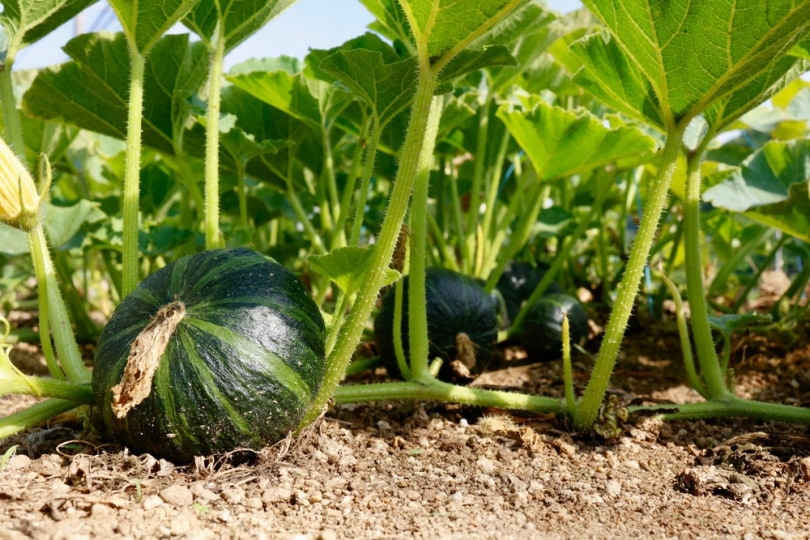
Squash is an ideal companion plant for eggplants because it shares similar sunlight requirements to produce large healthy fruits like eggplant. They both thrive from 6 hours of exposure to sunlight per day, so can be planted simultaneously. Simply ensure there is enough organic matter because squash is naturally greedy for nutrients.
23. Green Beans
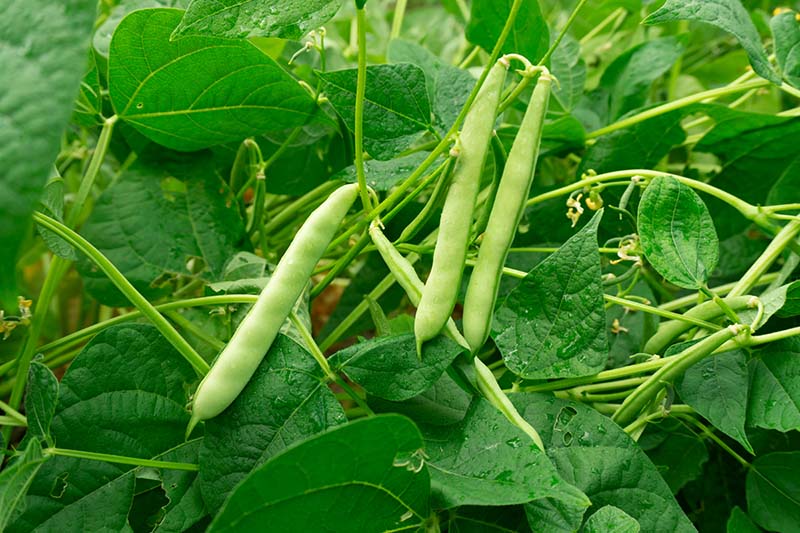
Green beans are an easy and cheap option for pairing with eggplants. Not only are they profitable when grown in a home garden, but you can also use the plant to keep pests like the Colorado beetle at bay.
Worst Companion Plants for Eggplants
As you may have gathered by now, companion planting is recommended to help maintain the beauty of eggplants and boost the yield. However, there some plants if planted next to eggplants could bring about their destruction. These plants include:
- Fennel: Fennels make poor companion plants for eggplants as they can easily deplete nutrients from the soil. This will prevent your eggplants from receiving the much-needed nutrients to thrive and produce healthy-looking purple fruits.
- Corn: Corn is also not a suitable plant to grow next to your eggplants. It is highly susceptible to pests, especially aphids. If planted in the same garden as your eggplants, it will attract aphids which will stunt its growth.
- Geranium: Granted, geranium has some pest-repelling properties when planted next to some plant species. However, when grown next to eggplants, your vegetables are likely to contract disease infections. Geraniums are vulnerable to a variety of diseases.
Conclusion
Choosing the best companion plant for your eggplant will depend on factors such as growing conditions, feeding and watering requirements, your budget, as well as your gardening preferences. Now that you know the best and worst companion plants for your eggplants, figuring out which paring works best shouldn’t be a problem. Happy Gardening!
Featured Image Credit: Rycky21, Pixabay
Contents


